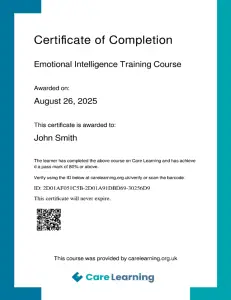Self-harm is a sensitive and complex issue that affects people of all ages and backgrounds. For health and social care professionals, understanding why individuals may self-harm, recognising the warning signs, and knowing how to provide safe, compassionate support is essential.
This free course provides a clear, practical, and empathetic introduction to self-harm awareness. You’ll explore the reasons behind self-harming behaviours, the links to mental health and suicide, and effective ways to support individuals while protecting their dignity and wellbeing.
Why Take This eLearning Course?
Supporting someone who is self-harming can be challenging and emotionally demanding. Having the right knowledge and strategies can make a meaningful difference.
Here’s why this course is for you:
- Understand self-harm clearly: Learn what self-harm is, how it differs from other forms of harm, and why individuals may engage in it.
- Recognise signs and indicators: Identify the physical, emotional, and behavioural signs of self-harm, including the self-harm cycle.
- Explore mental health links: Understand the connections between self-harm, mental health conditions, and suicide risk.
- Learn practical support strategies: Discover safe communication methods, alternative coping strategies, and crisis planning.
- Challenge stigma: Explore how stigma affects individuals and learn how to create supportive, non-judgemental environments.
- Build empathy and resilience: Develop compassion and strengthen your own emotional resilience when supporting others.
- Stay informed: Understand the relevant UK legislation, policies, and professional responsibilities around self-harm.
Learning Outcomes
By the end of this course, you will be able to:
- Define self-harm and explain how it differs from other behaviours.
- Recognise the reasons, triggers, and types of self-harm.
- Identify the signs and warning indicators of self-harming behaviour.
- Explain the relationship between self-harm, mental health, and suicide risk.
- Provide safe and supportive responses to individuals who self-harm.
- Use effective communication strategies and develop crisis plans where needed.
- Challenge stigma and promote access to support services and helplines.
- Apply empathy and compassion in sensitive situations, while protecting your own wellbeing.
- Understand your legal and professional responsibilities in relation to self-harm.
Course Content
This structured course is delivered across seven modules:
- Self-Harm – definition, reasons, types, triggers, and overview.
- Recognising Signs and Indicators – warning signs, behavioural and emotional indicators, and the self-harm cycle.
- Link to Mental Health and Suicide – connections with mental illness, suicide risk, and comorbid conditions.
- Support and Intervention – supporting individuals, communication skills, coping strategies, and crisis planning.
- Stigma and Accessing Resources – stigma reduction, helplines, services, and the role of digital support.
- Building Empathy and Compassion – empathy in practice, resilience strategies for professionals, and self-care.
- Legal and Policy Considerations – UK legislation, professional responsibilities, and safeguarding considerations.
The course also includes:
- Videos from trusted organisations such as the NHS.
- Knowledge checks to consolidate learning.
- Resources, glossary, and references for ongoing support.
Target Audience
This course is designed for:
- Health and social care professionals working directly with individuals at risk of self-harm.
- Carers and support workers seeking to understand and respond appropriately.
- Teachers, youth workers, and community support staff.
- Managers and team leaders overseeing staff who support individuals in crisis.
- Students and learners preparing for roles in care, education, or health services.
No previous training is required—this course is suitable for beginners and provides valuable depth for experienced practitioners.
FAQ
What does the course cover?
It covers definitions, triggers, signs, links to mental health, support strategies, crisis planning, stigma reduction, empathy, and relevant UK policies.
Can I apply what I learn straight away?
Yes. The course includes communication techniques, coping strategies, and real-world examples you can use immediately in your role.
How long will it take?
This self-paced course typically takes 1 hour to complete.
Will I receive a certificate?
Yes. You will receive a certificate upon completion to evidence your learning.
Is this course relevant to UK practice?
Yes. It has been developed in line with UK legislation, policies, and guidance for health and social care.
Is this course CPD accredited?
Our courses are not currently CPD accredited, but accreditation is planned.
Self-harm is a challenging issue, but with the right awareness, skills, and empathy, you can make a positive difference. This course equips you with the confidence to recognise, respond, and support individuals in a safe and compassionate way.
Join today and build your awareness of self-harm in health and social care.
You must log in and have started this course to submit a review.
Self Harm Training Course CPD Accredited and Government Funding
We’re working on getting this Self Harm Training Course CPD accredited, and any course that’s approved will be clearly labelled as CPD accredited on the site. Not every health and social care course has to be accredited to help you meet CQC expectations – what matters is that staff are competent, confident and properly trained for their roles under Regulation 18. Our courses are built to support those requirements, and because they’re not government funded there are no eligibility checks or ID needed – you can enrol and start learning straight away.



